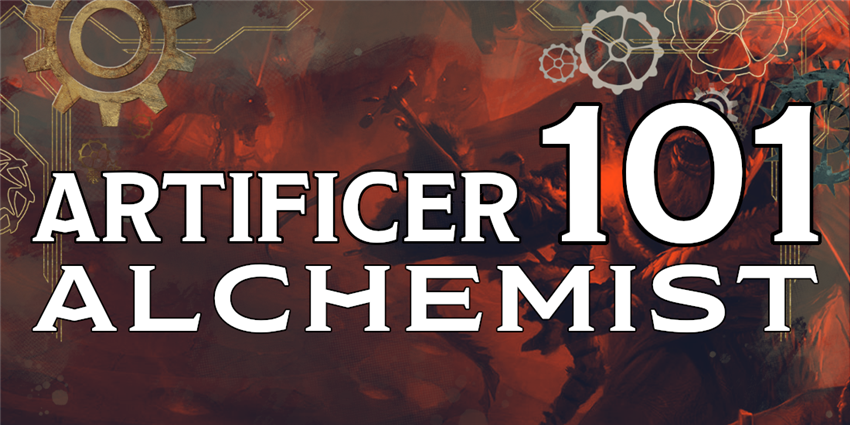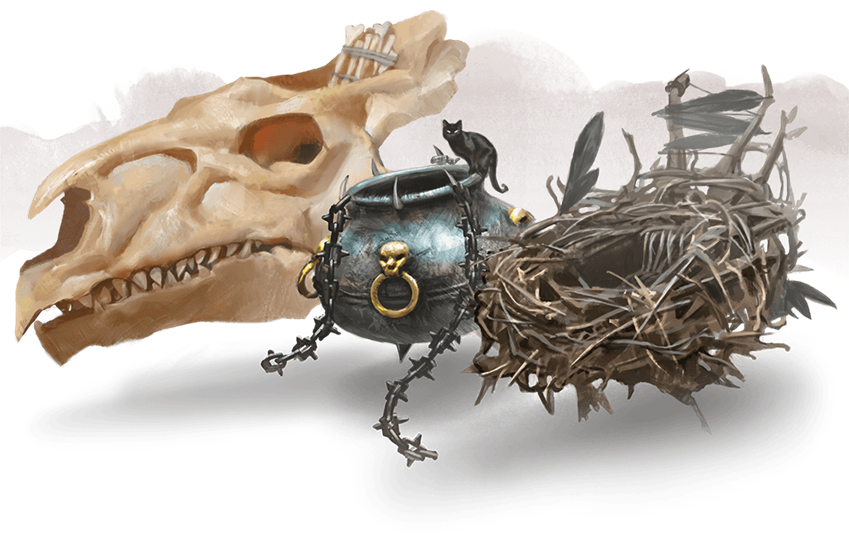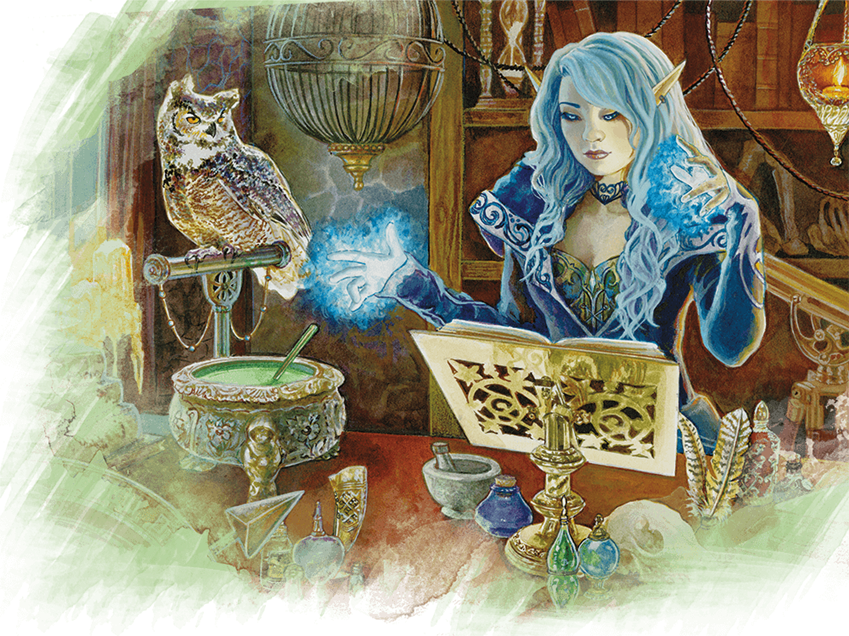 We’ve now completed a third rotation of the Player’s Handbook, meaning that almost every class has had every subclass from that book examined in the Class 101 series! Two classes with lots of subclasses—the cleric and wizard—will need a little extra time to cover. Starting this week, however, we’re moving away from the Player’s Handbook and taking a look at the brand-new subclasses that you’ll find in Tasha’s Cauldron of Everything, starting on November 17th! Since Tasha’s isn’t out yet, we’re doing something that isn’t a closely guarded secret: a subclass originally printed in Eberron: Rising from the Last War, the Alchemist artificer!
We’ve now completed a third rotation of the Player’s Handbook, meaning that almost every class has had every subclass from that book examined in the Class 101 series! Two classes with lots of subclasses—the cleric and wizard—will need a little extra time to cover. Starting this week, however, we’re moving away from the Player’s Handbook and taking a look at the brand-new subclasses that you’ll find in Tasha’s Cauldron of Everything, starting on November 17th! Since Tasha’s isn’t out yet, we’re doing something that isn’t a closely guarded secret: a subclass originally printed in Eberron: Rising from the Last War, the Alchemist artificer!
Artificers are most common in the world of Eberron, as described in Eberron: Rising from the Last War. However, artificers of some sort can be found all throughout the D&D multiverse. You can find artificers in the Forgotten Realms on the isle of Lantan, among the gnomes of Hupperdook in Wildemount, and filling all levels of prestige within the ranks of the Izzet League on the world-city of Ravnica—just to name a few settings where artificers can be found. If you’re playing D&D in another world or in a homebrew setting, talk with your Dungeon Master about how you could integrate artificers into this world.
(As thanks for your patience, we’ll be looking at one of the all-new subclasses in Tasha’s next week: the artificer’s Armorer subclass.)
Check out the other guides in the Class 101 series, like the broad overview of the artificer class in Artificer 101: A Beginner’s Guide to Making Magical Marvels. If you’re interested in playing other classes, check out the entire Class 101 series.
Story of the Alchemist
“What do you think, Froggy?” the alchemist said to her homunculus servant, a being of clay and alchemical compounds formed into the shape of a pudgy little toad with two feathery wings. “Licorice root might turn this potion into something all new!”
The homunculus croaked a doubtful croak.
“Oh don’t be such a downer,” the alchemist, a wide-faced half-elf, chirped. He lowered a tea strainer filled with licorice root shavings into his bubbling concoction. A billow of steam emerged from the glass, and the alchemist grinned wider and wider, clutching his fists to his mouth. Then, as the steam cleared, his smile went slack.
He made a nonplussed noise as he picked up the vial. “Well, it’s certainly turned it… green.” The liquid that had once been clear and effervescent was now green and stodgy. He turned to Froggy and held up the vial. “Well, Froggy, you think it’s good to drink? It smells nice. Probably won’t lacerate my liver, right? Well, if it does, you know where to find the cleric. The folks at North Ward Clerical Services probably know you by now.”
Froggy croaked affirmatively.
“Down the hatch, and…!” The alchemist tossed back the vial like it was a shot and stared, wide-eyed, at his homunculus, tapping his fingers together nervously. Then, a wide, contented smile spread across his face and his eyes drooped. He began to hover out of his chair and float gently up the ceiling. He burped as he hit his head against the ceiling and laughed. “Oh, Froggy, the party’s gonna get a kick outta this one!”
Alchemist Features
Alchemists are artificers who focus their studies in the infusion of potions and oils with magical power, often using magical reagents to kickstart the creative process. The artificer gains four subclass features at 3rd, 5th, 9th, and 15th level. You can read all of the Alchemist specialty features in Tasha’s Cauldron of Everything. In summary, your subclass features allow you to:
- Become proficient with alchemist’s supplies
- Learn new spells thematically appropriate for an alchemist
- Create experimental elixirs to aid you and your allies
- Deal bonus damage or restore additional hit points with your spells
- Grant temporary hit points with your experimental elixirs, and heal ailments
- Become resistant to acid and poison, and gain even greater healing capabilities

Benefits of the Alchemist
The Alchemist artificer specialty is the most full-bore support focused subclass of an already flexible support-leaning class. The artificer is playing at peak power when their player is focused on supporting their party with spells and infused items—the alchemist doubles down on this support theme by bringing a host of buff and debuff spells, while also creating useful experimental elixirs to buff their allies.
The true power of alchemists lie in their Experimental Elixir trait, which allows them to create useful potions at the start of the day for free, and even on the fly by expending spell slots. When spending spell slots to craft more potions, you get to choose the elixir’s effect rather than gaining a random one. When doled out to your entire party, a six-pack of Flight potions can obviate dozens of different challenges—and a collection of Transformation potions can make infiltration a breeze.
This isn’t to say that alchemists don’t have offensive options, either. Their spell list includes some spells of truly deadly power, like flaming sphere at early levels and cloudkill at the lofty height of 17th level. And even though their half-caster spellcasting progression makes them gain spells at a slower rate than powerhouse blasters like School of Evocation wizards or healing masters like Life Domain clerics, the Alchemical Savant feature pumps up the power of their healing and damaging spells, making the alchemist a useful and flexible buffer, debuffer, and secondary healer and damage dealer combo.
Drawbacks of the Alchemist
The Alchemist’s greatest strength is also its greatest weakness, from a certain point of view. A player looking for optimized mastery of a single field will walk away disappointed from this subclass. The artificer’s half-caster progression limits it to a woefully small pool of spell slots, advancing in power at a snail’s pace relative to a cleric or a druid. This progression limits the overall power of their spells, and the carelessness with which they can spend their spell slots.
Instead of tossing spells around with abandon, Alchemists must walk a tightrope of resource management. How many spell slots do you spend on your spells? How many do you spend on your Experimental Elixirs? Is it worthwhile to spend spells on damage when your party is hale and hearty, or is it wiser to hold back your spell slots in case the circumstances of the adventure turn against you? The power of a flexible role is counterbalanced by a greater need to keep an eye on the wellbeing of your party at all times, judging when it’s safe to tilt between offense and support—and when the right time has come to throw caution to the wind and go all-in.
Suggested Build
As an artificer, you choose what kind of Artificer Specialist you want to be at 3rd level. This gives you time to figure out what sort of role you want to fill in the party. If you decide that you want to fill a support role with flexible options for dealing damage, healing, and providing utility, social, and exploration buffs do your party, Alchemist is an excellent choice for you. To learn about the other roles the artificer class can fill, check out Artificer 101: A Beginner’s Guide to Making Magical Marvels.
All artificers need a keen intellect in order to be effective. As such, prioritize making your Intelligence score as high as possible. Beyond that, it’s useful to improve your Dexterity and Constitution scores to improve your defenses and your ability to use finesse weapons, just in case you’re ever separated from your artificer’s tools. Gnomes are good wizards, and their archetypal propensity for tinkering makes them a good fit for the artificer class, especially in the worlds of Faerûn and Krynn. The bonus to Dexterity and Intelligence granted by the high elf race is useful, and their extra cantrip grants you a nice bonus to your utility. And, as usual, the free feat granted by the variant human race is always helpful.
Choose EQUIPMENT instead of GOLD at the end of character creation. Your two simple weapons can be anything that you think fits your character’s aesthetic. Alchemists may be skilled with weapons like sickles, or other tools that could double as a weapon. Choose studded leather armor if you’re focusing on having a higher Dexterity—but you can choose scale mail if you want to be a more frontline battle-alchemist.

Spells
You prepare your spells, just like a cleric or druid. At the end of every long rest, you can prepare a number of spells from the artificer spell list, and can use your spell slots to cast these prepared spells in any combination. When you prepare spells, you can choose a number of artificer spells equal to your Intelligence modifier + half your artificer level, rounded down (minimum of one spell). You also start play with two cantrips, also chosen from the artificer spell list. These cantrips are 0-level spells that you can cast an unlimited number of times per day.
As an Alchemist, you’ll want at least two spells marked SUPPORT, one spell marked either OFFENSE or DEFENSE, and one spell marked either SOCIAL or UTILITY, depending on how you want to play your character.
- Catapult (OFFENSE)
- Cure wounds (SUPPORT)
- Detect magic (UTILITY)
- Disguise self (SOCIAL)
- Faerie fire (SUPPORT)
- Feather fall (UTILITY)
- Grease (DEFENSE)
- Purify food and drink (UTILITY)
Infusions
Starting at 2nd level, you’ll be able to infuse items with magical power, turning them into something greater than what they were before. At 2nd level, you know four different infusions, and can have two of them active at a time. The infusions you pick should be largely based not on your build, but the composition of your party. What infusions do they need to be more powerful? Every time a party member does something awesome with an infused item you’ve given them, that’s a win for both of you.
You learn four infusions at 2nd level, and can replace any infusion you know with another one whenever you gain a level. Some useful infusions include:
Enhanced Arcane Focus. For parties with spellcasters in it. Even though you usually use your artificer's tools as a spellcasting focus, you can benefit from this infusion as well—since any item you create can be used as a spellcasting focus!
Enhanced Defense. For parties with heavily armored allies. You can use this one yourself, if enemies have been focusing you down lately!
Enhanced Weapon. A broadly useful infusion for parties with damage-dealing powerhouses in it.
Replicate Magic Item. The raw utility of this infusion, which lets you create a vast swath of useful magic items, can’t be understated. Though you can only create one specific magic item with this infusion, you can learn it multiple times to gain access to multiple magic items. All artificers should have it!

Feats
Once you’ve improved your Intelligence score to 18 or 20, you can increase your power with a few useful feats. The following feats are good picks for Alchemist artificers, and will improve your reliability in your own desired area of expertise:
Chef. This new feat from Tasha’s Cauldron of Everything is perfectly suited to an alchemist. Who better than you to make gourmet food with the power to rejuvenate the body?
Elemental Adept. If you like to deal damage buffed by your Alchemical Savant feature, finding an element that you favor and taking the Elemental Adept feat will make you more reliable with your element of choice.
Healer. Being able to heal allies without spending spell slots is a useful tool for the spell-slot starved artificer.
Poisoner. This new feat from Tasha’s Cauldron of Everything is a boon to any character who deals in poisons. Your mastery of alchemical agents makes you a perfect candidate for a master poison maker. Take this feat to lean into that story!
If you want more advice for building an artificer, check out Artificer 101. Have you ever played an Alchemist artificer? What advice would you give to players that want to play this subclass? Join us next week as we dive deep into the contents of Tasha's Cauldron of Everything with Artificer 101: Armorer!
Create A Brand-New Adventurer Acquire New Powers and Adventures Browse All Your D&D Content
 James Haeck is the lead writer for D&D Beyond, the co-author of Waterdeep: Dragon Heist, Baldur's Gate: Descent into Avernus, and the Critical Role Explorer's Guide to Wildemount, a member of the Guild Adepts, and a freelance writer for Wizards of the Coast, the D&D Adventurers League, and other RPG companies. He lives in Seattle, Washington with his fiancée Hannah and their animal companions Mei and Marzipan. You can find him wasting time on Twitter at @jamesjhaeck.
James Haeck is the lead writer for D&D Beyond, the co-author of Waterdeep: Dragon Heist, Baldur's Gate: Descent into Avernus, and the Critical Role Explorer's Guide to Wildemount, a member of the Guild Adepts, and a freelance writer for Wizards of the Coast, the D&D Adventurers League, and other RPG companies. He lives in Seattle, Washington with his fiancée Hannah and their animal companions Mei and Marzipan. You can find him wasting time on Twitter at @jamesjhaeck.











-
View User Profile
-
Send Message
Posted Nov 17, 2020The Pathfinder 2 alchemist class is a full-on support character who can still pump out quite a bit of damage if they choose the right formulae. If you want a few more options, consider taking inspiration from a few of their formulae (though be aware that they don't get spells, but rather a number of "infused reagents" which they turn into alchemical items, so these options might be more powerful to compensate for that).
-
View User Profile
-
Send Message
Posted Nov 17, 2020Where is the 'gourmand' feat? Sounds more like a flaw than a feat
-
View User Profile
-
Send Message
Posted Nov 18, 2020That is the same as Chef, I assume there was a name change
-
View User Profile
-
Send Message
Posted Nov 18, 2020Aren't enhanced arcane focuses considered magic (which means you couldn't infuse it anyway, since only mundane objects are infusable)
-
View User Profile
-
Send Message
Posted Nov 18, 2020Surprised this article doesn't mention Healing Word. Alchemical Savant is a killer feature - with 18 intelligence, your Healing Words are healing for 1d4+8 (or 1d4+10 if you roll stats well and can hit 20 intelligence at Level 4), which makes a world of difference. Also great for damage dealing cantrips - At level 5, a Firebolt that can do a minimum of 6 damage (2d10+4 or 5) feels so much better than a minimum of 2.
-
View User Profile
-
Send Message
Posted Nov 19, 2020This article is really stretching hard to make the alchemist sound decent. We had to homebrew buff it cause it is so useless. It is a huge shame it wasn't changed for Tasha's.
These articles would be more useful if James was truthful about bad design and gave advice on how to fix it.
Here are two simple changes for you. Give all artificers Mending for free. Also, remove the randomness of potions. It is dumb and adds nothing.
-
View User Profile
-
Send Message
Posted Nov 19, 2020I like how the first paragraph of the story makes the alchemist female but the rest of the story makes it male.
-
View User Profile
-
Send Message
Posted Nov 24, 2020What is that a reference to?
-
View User Profile
-
Send Message
Posted Nov 25, 2020This is really helpful, Thanks!
-
View User Profile
-
Send Message
Posted Nov 25, 2020Any potions beyond the first (the ones that use spell slots) are not random. James doesn’t believe in bad design (and neither do I). And Alchemical Savant is the really powerful feature everyone overlooks.
-
View User Profile
-
Send Message
Posted Nov 29, 2020Gotta put Tasha's caustic brew as a recommended spell for this sub class!!! A nice way to use concentration until you get flaming sphere and it's super flavourful for this class (not for your enemies!)
-
View User Profile
-
Send Message
Posted Dec 7, 2020I agree, the potions are pretty good (alter self is our group's bread and butter when it comes to infiltration) and I can see Alchemical savant as an excellent damage buff. I have no intention of playing one soon but I recommended the subclass to a friend who wanted to make a drug dealer, the potion's effects made for really great drugs if you re-flavor them. I recommend d giving this subclass a better look
-
View User Profile
-
Send Message
Posted Jan 28, 2021If you really want to play an alchemist, look at the Alchemist class option from Pathfider's Advanced Player's Guide. Focuses more on damage than healing, just a thought.
-
View User Profile
-
Send Message
Posted Mar 9, 2021Tieflings actually make nice alchemists. I am playing one.
-
View User Profile
-
Send Message
Posted Apr 28, 2022A couple quick tips I don't see here for optimizing Alchemist:
1. Your homunculus is amazing. It should always be carrying something. At lower levels, it can carry acid or alchemist's fire and dump it on enemies for you. It can dump oil on an enemy to give you +5 on fire-based attacks...which at level 5 get buffed with Alchemical Savant. (If you get your INT maxed, that's a 10-damage bonus to fire bolt.) At level 9 and later, they can carry a Healing Elixir, and if someone goes down, you can bonus action command the homunculus to use their action to administer it to them, and that's a health potion with temp hp with the same cast time as healing word (and you can still use a spell as an action on your turn). Or they can administer it to you if you go down and you're back up with a temp hp buffer. At level 11, they can wield your Spell-Storing Item to shoot acid arrow up to 10 times a day, giving you 6d4+5 acid damage with your bonus action. Use your homonculus.
2. Elixirs are amazing. Concentration-free flight at level 3 means you can set up web, fly just over it, and then challenge mobs to come at you. (Or pull them in with thorn whip.) Concentration-free alter self lets you cast a concentration spell while looking like someone else...or while breathing underwater. The Boldness Elixir stacks with the bless spell to, on average, cancel the -5 penalty to Sharpshooter or Great Weapon Master. If a battle's about to start, Ready an Action to drink an elixir (or ask your DM if you forgot) and you can discover insane tactical advantages with any of them.
3. You get a special benefit from the Spell Sniper feat. You can use it to learn a tactical attack roll cantrip from the wizard list like ray of frost or shocking grasp that wouldn't benefit from Alchemical Savant anyway. Then learn thorn whip from the artificer list. If you get hit with an attack that matches one of the Alchemical Savant types, and you react with absorb elements, then the next turn you can use thorn whip to attack an enemy up to 60 feet away with +1d6+5 of that damage...or however many d6 based on the level you cast absorb elements. (Because thorn whip is a melee spell attack, and absorb elements is an artificer spell, the bonus damage applies.) This is great for characters like Alchemists who work best at range, so you can be 60 feet from an enemy and still make the most of your elemental defense spell.
4. There's a hidden benefit in the Artificer Initiate feat for Alchemists. If you choose the Custom Lineage or Variant Human race to get a feat at first level (or have a lenient DM who will flex the rule of tool choice at a later level), you can do more than simply get an extra cantrip (like acid splash or green-flame blade) and a free level-1 cast (like absorb elements) to add to your always-prepared list. Choose alchemist's supplies as the tool you learn, and now any other spell you cast with INT you'll be able to have a spellcasting focus for...AND after 5 levels in Alchemist you'll be able to add your Alchemical Savant damage to any INT spell of the applicable type that you ever learn, because you can cast any of them with alchemist's supplies. So take 5 levels in wizard and you'll get the Alchemist capstone feature of damage resistances and free casts of high-level support spells PLUS a level 8 alchemical fireball (because artificer levels round up in multiclassing) with 5 bonus damage for each enemy in the AoE. So that's essentially a level 9 fireball with a point or two extra.
5. If you get an All-Purpose Tool of any kind, you can get all sorts of game-breaking combos with your choice of any cantrip in the game counting as an artificer cantrip. Shillelagh, toll the dead, or even a versatile cantrip like produce flame to replace your one-note fire bolt and still get Alchemical Savant damage bonus. Up to you.
There's plenty more to discover about optimizing the Alchemist, but these are my top tips. I hope someone out there gets inspired to give them some much-deserved love!
-
View User Profile
-
Send Message
Posted Jun 28, 2022is there an Update on 101 with the extremely poorly designed Alchemist?